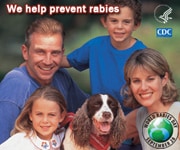When should I seek medical attention?
If you’ve been in contact with any wildlife or unfamiliar animals, particularly if you’ve been bitten or scratched, you should talk with a healthcare or public health professional to determine your risk for rabies or other illnesses. Wash any wounds immediately with soap and water and then plan to see a healthcare provider. (It’s important to know that, unlike most other animals that carry rabies, many types of bats have very small teeth which may leave marks that disappear quickly. If you are unsure, seek medical advice to be safe.)
Remember that rabies is a medical urgency but not an emergency. Decisions should not be delayed.
See your doctor for attention for any trauma due to an animal attack before considering the need for rabies vaccination. After any wounds have been addressed, your doctor – possibly in consultation with your state or local health department – will help you decide if you need treatment known as rabies postexposure prophylaxis (PEP). Decisions to start PEP will be based on your type of exposure, the animal you were exposed to, whether the animal is available for testing, and laboratory and surveillance information for the geographic area where the exposure occurred.
In the United States, PEP consists of a regimen of one dose of immune globulin and four doses of rabies vaccine over a 14-day period. Rabies immune globulin and the first dose of rabies vaccine should be given by your health care provider as soon as possible after exposure. Current vaccines are relatively painless and are given in your arm like a flu or tetanus vaccine; rabies vaccines are not given in the stomach.

